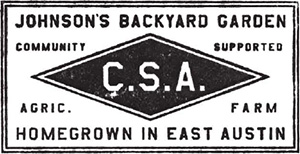
STORMY WEATHER
02/17/09 — Aaron
Stormy Weather
Johnson's Backyard Garden- February 17, 2009
 Table of Contents
1) In Your Box this Week
2) Farm News
*Stormy Weather
*Greenhouse Update
*Food & Politics Book Club
*Log into your Account
*Building Implements
*Composting
3) Events
*Texas Wine and Grape Growers Association
*Permaculture Design Course
*Green Garden Festival
*Vermicompost Workshop
4) Quotable Food
5) Recipes
*Garlicky Greens
*Gumbo Z'herbes
6) Vegetable Storage Tips
7) Johnson's Backyard Garden Contact Information
Table of Contents
1) In Your Box this Week
2) Farm News
*Stormy Weather
*Greenhouse Update
*Food & Politics Book Club
*Log into your Account
*Building Implements
*Composting
3) Events
*Texas Wine and Grape Growers Association
*Permaculture Design Course
*Green Garden Festival
*Vermicompost Workshop
4) Quotable Food
5) Recipes
*Garlicky Greens
*Gumbo Z'herbes
6) Vegetable Storage Tips
7) Johnson's Backyard Garden Contact Information
Please send newsletter feedback, suggestions and contributions to farm@jbgorganic.com
We're on MySpace, be our friend! We're also on Facebook!

1) In Your Box this Week
Swiss Chard Carrots Parsley Mint Broccoli Kale Arugula Brussels Sprouts Pac Choi Cauliflower or Tomatoes Oranges Grapefruit This list is subject to change depending on availability and quality of crops on harvest day. You'll find the most accurate packing list on the homepage of our website.
2) Farm News
- Stormy Weather- We have been giddy about receiving all the recent rain, the field transplants have responded very well. But over the weekend, the much needed rain came with strong winds. Our neighbor's pecan tree decided to let loose a branch which found its way through the roof of the barn. Luckily, the winds lasted only through the night and no other damage was to be found around the farm.

- Greenhouse Update- Challon, along with the electrical crew from RPE Enterprises, have worked through the week installing wiring inside the greenhouse. This means the climate control, fans, and, hopefully, a new irrigation system will be in operation soon. Challon will be enclosing the last wall of the greenhouse in the coming week.

- Food & Politics Book Club - Our first book club meeting was a success and the second one is next Saturday at the farm! The Food & Politics Book Club was launched on a crisp Saturday afternoon in middle December. As the meeting time drew closer, people started trickling in - some of them were JBG CSA members and farm volunteers and some of them bumped into the club while combing the web - all of them were super nice, high spirited and eager to get started. We had come together to discuss "Banana - the fate of the fruit that changed the world", a book that had certainly altered our perception of one of our most beloved fruit staples.

- Building Implements- This week the floor of the packing shed was covered with tools, instructions and parts for the construction of three implements to be used with the tractors. A three row cultivator, a soil amendment spreader, and something to install sub-surface drip tape (we haven't come up with a working name for it yet, any suggestions are welcome) were assembled for use later this season.


![implement-building Putting the pieces together- building farm implements]()
- Putting together farm implements.
- Log into your Account and check details regarding pickup, renewal and changing your orders. It's a great way to save time and improve accuracy of all our subscription.

- Composting- We were also able to clean up the compost bins this weekend. We have a parade of rural critters who would like to call our compost 'the dinner table'. Now, I realize we won't be able to keep them all out by keeping the piles raked up and covered with soil, but hopefully it will help. This compost is not used on the fields, because we actually produce a relatively small amount of waste and there just isn't enough to go around. Dylan and I are planning to plant some flowers and mints around our living quarters to make use of the compost.

3) Events
- Texas Wine and Grape Growers Association Annual Conference and Trade Show. Austin. February 19-21. www. txwines.org
- Permaculture Design Course 9 a.m. to 5 p.m. select weekend days until March 28. Check www.permie.us for schedule. March 7 and March 21-22 design workshops are for full-course students and graduates from design class only. TreeFolks, 10803 Platt Lane. $500 whole course; $60 each day. 619-5363.
- Green Garden Festival Noon to 4 p.m. Feb. 22. Landscape festival featuring earth-wise gardening tips and learn how to have a beautiful yard while conserving and protecting air and water, protecting our climate and recycling waste and natural materials. Zilker Botanical Garden, 2220 Barton Springs Road. Free. www.ci.austin.tx.us/greengarden
- Vermicompost Workshop 1 to 2:30 pm. February 21. Learn how to recycle kitchen scraps into rich fertile worm castings for your plants. At this free workshop, Joy Ruth will share how easy it is to make and care for a worm bin. Great classroom or family project! Registration required. Please call Emily Neiman at 236-0074 x5 or email emily@sustainablefoodcenter.org. Terrazas Library,1105 E. Cesar Chavez St.
 4)Quotable food:
4)Quotable food:
- "The next time you feel like complaining, remember that your garbage disposal probably eats better than 30 percent of the people in the world."
Robert Orben
5) Recipes:- Sarah Sloan, CSA member, sent this recipe last week. Sarah says "With all the greens we are getting, I thought it might be nice to include this. It is pretty simple and I love this website too. Lots of vegetables."
Garlicky Greens from 101Cookbooks.com If you are using spinach ignore the stem instructions below. With spinach I simply trim any long stems. Also, feel free to make this vegan and/or dairy-free by leaving out the Parmesan cheese. Toasted almonds or pine nuts are a great substitution (or addition). 1 large bunch of kale, chard 2 tablespoons extra-virgin olive oil fine grain sea salt 5 cloves of garlic, crushed and chopped 1/4 cup Parmesan cheese (opt) crushed red pepper flakes To de-stem each leaf of chard/kale, grab the main stalk in one hand and strip the leaf from the stem all the way up with the other. I then tear the big leaves into bite-sized pieces, but you can use a knife for this task if you prefer. Wash the greens in a big bowl (or sink) full of clean water, rinsing and swishing to rinse away any stubborn grit and dirt. Drain, rinse again, and set aside.
Hold off cooking the greens until just before eating. Then, in a large skillet heat the olive oil. Add a couple big pinches of salt and the greens. They should hiss and spit a bit when they hit the pan. Stir continuously until their color gets bright green, and they just barely start to collapse - two, three, maybe four minutes, depending on how hot your pan is and how much structure your greens have. Then, just thirty seconds before you anticipate pulling the skillet off the heat, stir in the garlic. Saute a bit, remove the pan from the heat, stir in the Parmesan, and add a big pinch of crushed red pepper flakes. Taste, add a bit of salt if needed, and serve immediately if not sooner. Serves 2- 3.
- Gumbo Z’herbes (Green Gumbo) -from the kitchen of Andrea Roberts, CSA member (given to her by Debbie Samoson)
Greens: (use as many of these as are available: a minimum of 5 is adequate, 7 is ideal) 1 bunch of – collard greens      mustard greens      kale turnip greens       scallions                 radish tops parsley                  watercress             chicory spinach                 beet tops                 carrot tops swiss chard          small head green cabbage The Gumbo Base: 1 cup chopped onion ½ lean baked ham, cut into ½ inch cubes* ½ lb. Creole smoked sausage, cut into ½ inch cubes (pan grill briefly and drain fat) 1 large ham bone, sawed into 3 to 4 inch lengths The Roux: ½Â cup vegetable oil 2/3 cup flour The Liquid and Seasonings: 2 quarts plus 1/3 cup cold water 1 tsp salt ¼ tsp freshly ground black pepper 1/8 tsp cayenne 2 whole bay leaves, crushed ½ tsp dried thyme ½ tsp dried marjoram** 2 whole cloves** 6 whole allspice** Wash all greens thoroughly, trim off any tough stem ends. Place the damp greens in a heavy 3-to-4 quart saucepan, and add the 1/3 cup cold water, and heat on high. When the liquid starts to boil, cover the pan tightly, reduce heat to medium, and cook greens for 12-15 minutes, or until just tender. Drain the greens, reserving the liquid. Chop the cooked greens fine and set aside.*** In a large 7 or 8 quart heavy pot or kettle, heat the oil over high heat. Reduce the heat to low and gradually add the flour, stirring constantly. Cook over a low heat, always stirring, until a golden brown roux (the color of peanut butter) is formed. Quickly add the chopped onion, stir thoroughly, and continue browning for 5 minutes longer, still stirring. Add the ham, sausage, and the liquid from cooking the greens; mix well, then gradually stir in the chopped cooked greens. Add the ham bone and the seasonings, keeping the heat at low, gradually add the 2 quarts cold water, stirring to mix thoroughly. Raise the heat to high, bring the gumbo to a boil, then lower the heat again to low and simmer for 1¼ hours. Serve over boiled rice. * I use less ham than this – the recipe is very flexible. ** I usually don’t have all of these seasonings, and so I just improvise with what I have. *** I chop the greens before I steam them.
We would love to share your recipes, too! Please email your favorites to bess@jbgorganic.com

6) Vegetable Storage Tips
We aim to grow and package our vegetables to maintain the highest taste and nutritional quality possible. However, once they've left the farm it's up to you to keep them fresh and nutritious. There's no refrigeration at the CSA drop points so it's best to pick up your box as early as possible. Here are some additional tips on how to store this week's share:
Spinach, Kale, Chard, Lettuce, Salad Greens, Bok Choy, Braising Mix and Cooking Greens will stay fresh in the crisper for 4-7 days and should be kept in plastic bags. Any bunch greens can be freshened by cutting an inch of the bottom stalks and soaking the entire bunch in cold water for 10 minutes. Place in a plastic bag in the fridge for a few hours to revive.
Cabbage and Celery have a fridge life of up to two weeks. Wrap celery in plastic.
Broccoli will last 4-7 days in plastic bags in the crisper.
Oranges and Grapefruit are best kept at room temperature of 60-70 degrees and used within two weeks. Do not store in plastic bags.
Checkout our storage tips on our website for a more complete guide, and of course, feel free to contact us with any questions. The National Center for Home Food Preservation is your guide for how to can, freeze, dry, pickle or ferment just about anything.
7) Johnson's Backyard Garden Contact Info
Johnson's Backyard Garden 9515 Hergotz Lane, Box E Austin, Texas 78742
Office phone:Â (512) 386-5273
Office Hours:Â M-F, 8am - 12pm
e-mail: farm@jbgorganic.com website: www.jbgorganic.com






 0 ITEMS IN CART
0 ITEMS IN CART 


